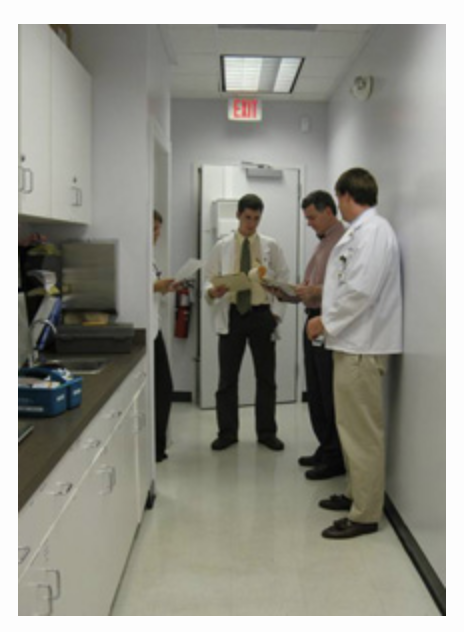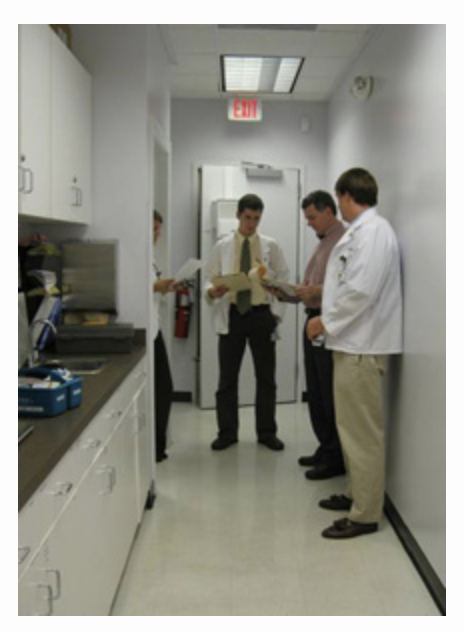The Student-run Free Clinic: If Your University Doesn't Have One, It Should
Wanda Gonsalves, MD, Medical University of South Carolina, cochair, STFM Group on Student-Run Free Clinics
After being energized by Dr Ellen Beck’s mini fellowship, “Addressing the Health Care Needs of the Underserved” in 1999, I was convinced that student-run free clinics (SRFCs) were an excellent method to help our students achieve the learning outcomes that we as family medicine educators wanted: empathic, critical thinkers that care about the community in which they live. Since then, I’ve worked with medical students to reorganize or develop student-run free clinics at the University of Kentucky and now at the Medical University of South Carolina.


Students discuss patient cases within the Student-run Free Clinic with William Hueston, MD, (second from right) chair of the Department of Family Medicine, Medical University of South Carolina.
In recent years, there has been a growth in student-run free clinics across the country. It is estimated that there are more than 49 medical schools operating approximately 110 student-run clinics.1 Additionally, there is a growing body of literature describing either program development of student-run clinics, program evaluation, and to a lesser degree learning outcomes. A recent article by Meah et al, “Student-run Health Clinic: Novel Arena to Educate Medical Students on Systems-based Practice” reviewed the existing literature published about SRFCs and categorized the learning experiences offered by the student clinics.1 The article concluded that the SRFCs model of experiential (service-learning) education promoted leadership, critical thinking (tackling unforeseen problems occurring in their clinics), and knowledge of the health care system not obtained from medical school, such as cost-effective care and systems-based practice. Additionally, SRFCs can “be an arena for socially conscious and responsible education where the best standards of care, in the face of limitations in resources are understood, promulgated, and advocated for all patients regardless of socioeconomic status.” A systematic review of the literature by Dornan et al, “How Can Experience in Clinical and Community Settings Contribute to Early Medical Education?” concluded that early experience in the community helped not only students but potentially benefits other stakeholders including teachers and patients and may influence career choice toward primary care.2
Three years ago, students across the country organized the first national student-run clinic conference, which was held in New York. From there, students formed a national organization, The Society of Student-run Clinics, which has partnered with STFM to promote and implement their national conferences. Further, faculty that participated in those conferences formed a Group on Student-run Clinics with the goal of supporting faculty with similar interests and mentoring students who are organizing their national conference. The first STFM and Society of Student-run Clinics collaboration and national conference took place in Jacksonville, FL, at the Predoctoral Education Conference in January 2010, now called the STFM Conference on Medical Student Education. It was highly successful, drawing more than 150 students from the United States and three countries, including Australia, Canada, and Beijing, China. Plans are currently underway for the Second Annual Medical Student Conference with the Society of Student-run Clinics. The SSRC’s Web site may be found at www.studentrunfreeclinics.org.
In summary, the growing interest in the SRFCs, along with the enthusiasm generated by students and faculty for this teaching method, should stimulate more research for student learning outcomes. Hopefully, it will generate more interest in family medicine as a career choice.
References
1. Meah Y, Smith E, Thomas D. Student-run health clinic: novel arena to educate medical students on systems-based practice. Mt Sinai J Med 2009;76:344-56.
2. Dornan T, Littlewood S, Margolis SA, et al. How can experience in clinical and community settings contribute to early medical education? A BEME systematic review. Med Teach 2006;28(1):2-18.
